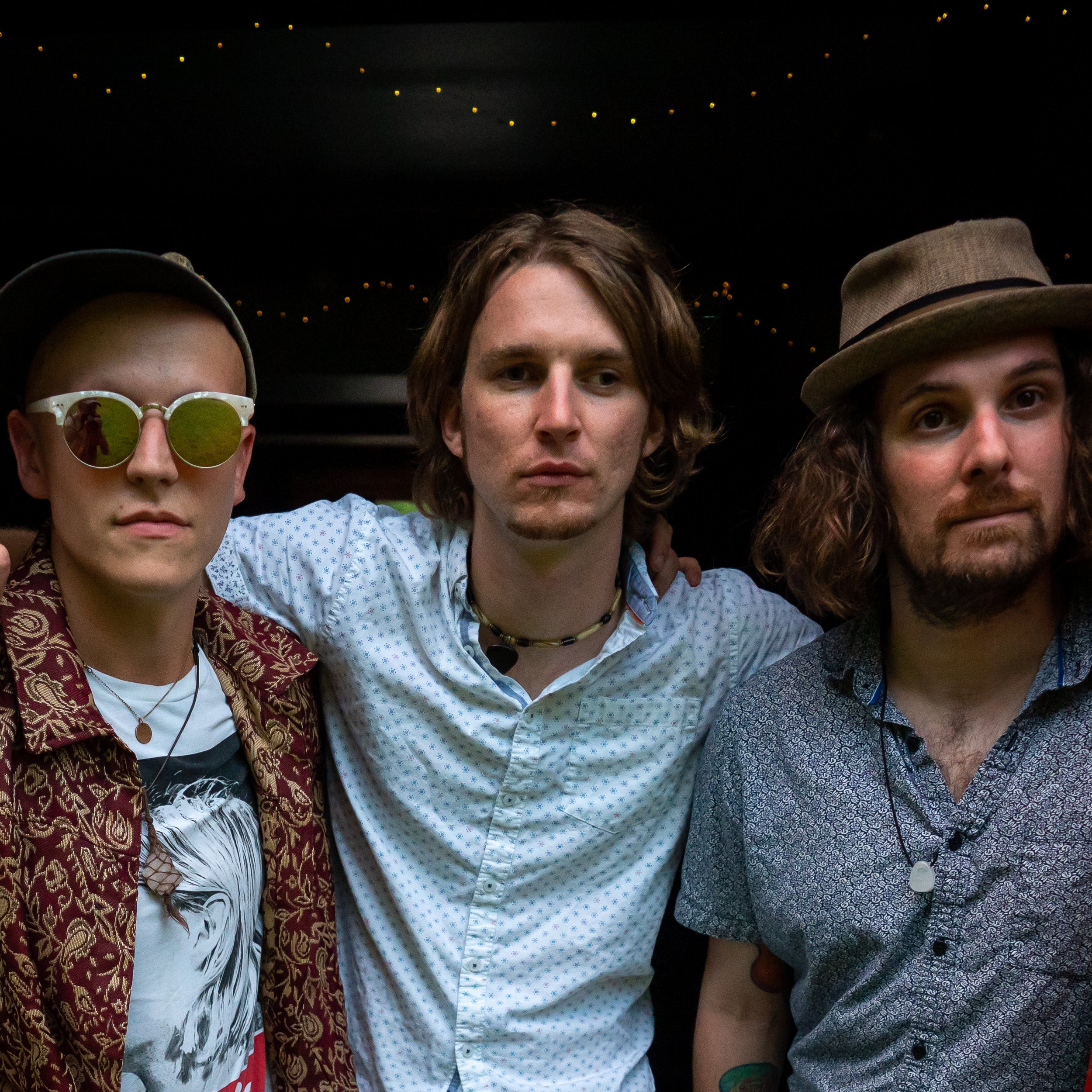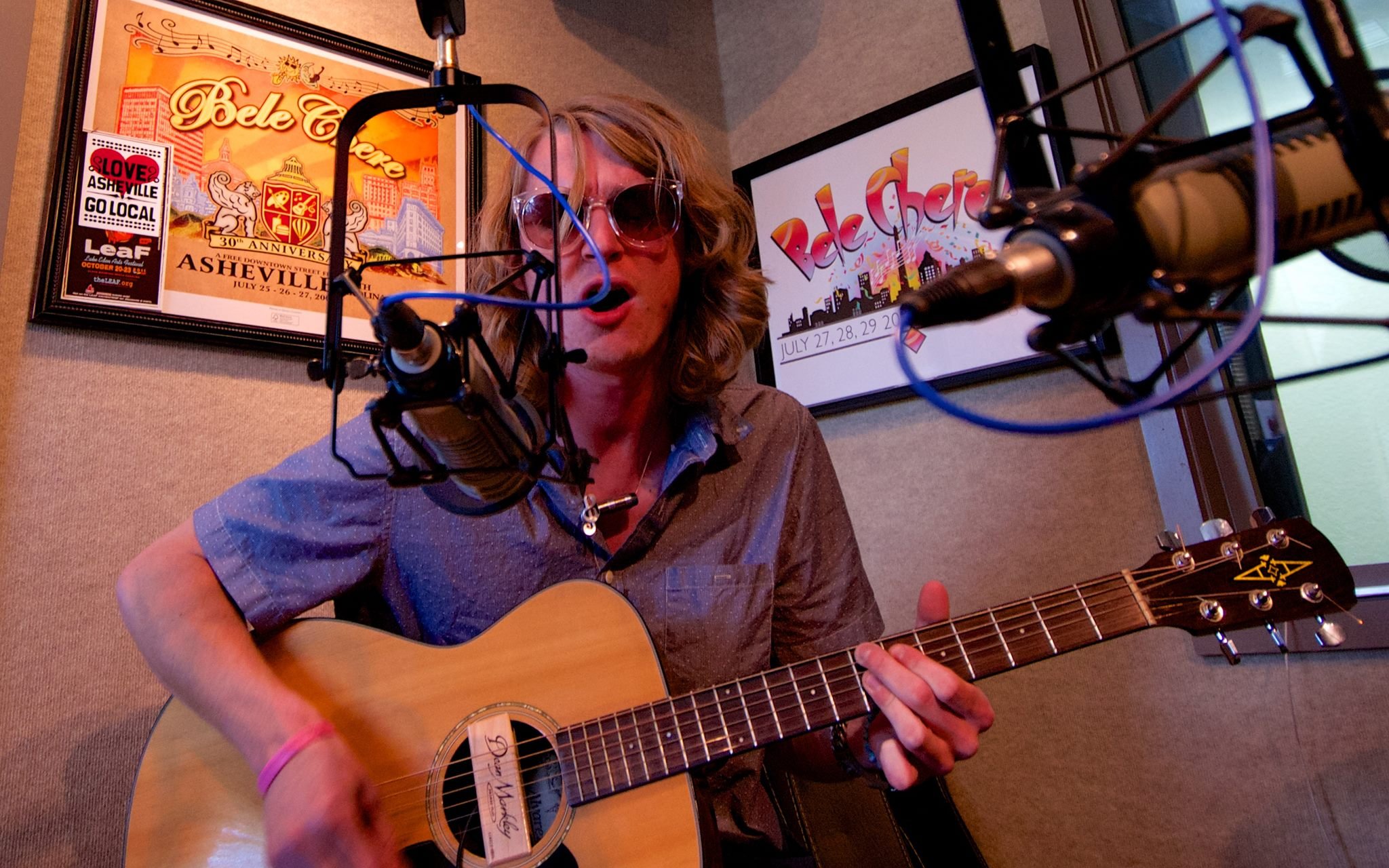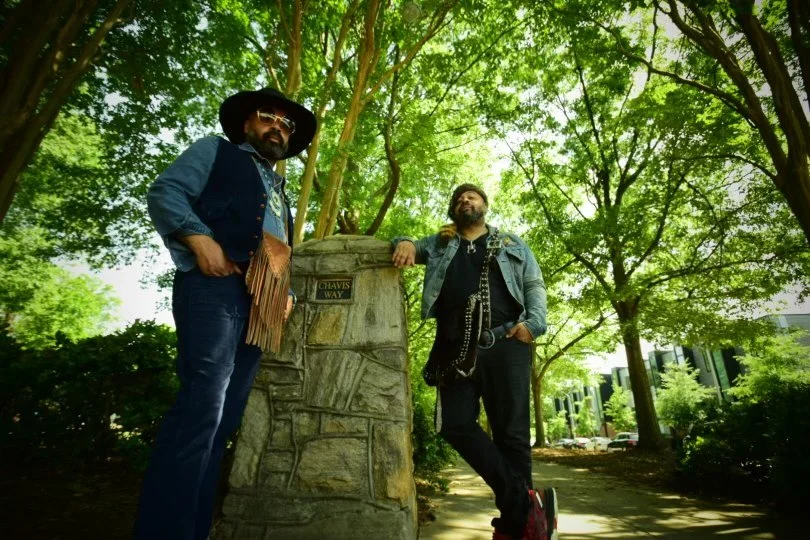Interview: Andrew Scotchie
For the past 10 years, Andrew Scotchie and The River Rats have been synonymous with quality rock ‘n roll — and Asheville. United by a shared love of music, these teens have grown into adults before the city’s eyes, elevating the scene in numerous ways, both on stage and off.
Prior to celebrating the band’s decade anniversary at the Inaugural Scotchie Music Family Reunion, Friday, June 17-Sunday, June 19, at USA Raft Adventure Resort in nearby Erwin, Tenn., Scotchie spoke with Asheville Stages about the group’s various evolutions, lessons learned, and hopes for the future.
Edwin Arnaudin: When you started The River Rats in 2012, what were your goals for yourself and the band? How have those goals evolved over the past decade?
Andrew Scotchie: Most of the goals I had for myself and the band were quite simple and some remain the same to this day: Write honest music, play as much as humanly possible, consistently improve, have fun, and try to make decisions that would ultimately lead to a life in the music industry. When you're 19 or 20 vs. almost 30, what you "need" and "want" or what you consider to be "success" differ wildly. The band and I were — and still are — addicted to the irreplaceable spiritual release that only live performances can offer. The songs had a sense of urgency, a sense of healing and, simply put, it was an outlet: it was our voice.
I knew I was most happy working for myself and the band gave everyone involved a sense of ownership and pride. Part of the dedication — or perhaps obsession — in the early days was fueled by the deep desire I had to not get trapped in a job I wasn't happy in. I knew nothing else in my life inspired or moved me the way music did. I fell in love with how unconventional of a career in music was. Today, there are more refined aspirations — tours, collaborations, songs with heavier themes, etc. — and a better sense of where to invest time, but at the core, the only things that really matter are putting out honest music, appreciating those who appreciate the music, and providing a service that can truly change lives.
EA: Looking back, what memories and accomplishments from the band’s history most sharply stand out to you?
AS: There are many that come to mind. The first time we got a mention in Mountain Xpress; our first radio airplay in another city; our first Studio B performance on WNCW; recording the first batch of songs in Daniel Earle's basement; moving Barnaroo to Franny’s Farm; recording and learning from Matt Williams; touring out west for the first time; the first sold out show; learning new songwriting approaches; irreplaceable sonic breakthroughs onstage; and landing festival slots like Bristol Rhythm & Roots Reunion or Brevard Blues Festival. Getting noticed and appreciated in and outside of our hometown was jet fuel and further enforced that there was something special going on. Any time there was encouragement from players in the industry that started decades before us or played a totally different kind of music, those moments and conversations stand out.
Perhaps the greatest and most inspiring feeling, though, is when fans of the music would take time to message me and the band or come up after a show and describe how a song or show helped them through a hard time in their life or helped define a pivotal era in their life. Those moments remind you that good music becomes greater than one person or one band; it becomes a potent piece of universal energy that can never be destroyed. A person can be moved so profoundly from one song or one show and go out into the world inspired to be a better person or to do something great, thus hopefully causing a positive ripple effect.
EA: How about the not-so-great parts?
AS: Of course, there were plenty of tough and heartbreaking moments, but, looking back, I am appreciative of so many of those moments because they taught me something. It was never easy when a band member left or had to move, but each time that happened, the sound would evolve and lessons were learned. Being an independent artist without wealthy parents, a slick manager or massive connections out of the gate, you quite naturally have to be your best advocate and you learn so much on your own and by observing others.
How to act and react in certain business situations; when to be stubborn with your vision and when to be flexible; what kind of people you should invest your trust and money into; when to take time off; healthy and unhealthy pre-show/post-show rituals; how long to drive or not drive after performing; how to tell when someone is blowing smoke up your ass; the difference between a new fan versus someone that is just totally wasted; things to say and not say on a live radio interview; the right kind of gear to use onstage; "proper" on-stage etiquette; remembering to thank the sound team every chance you can; using people's doubts of your goals as fuel; fostering and building relationships with those you want in your musical family. etc., etc. I plan on releasing a book in the next couple of years and there will be a lot of specific stories in it, to say the least.
EA: The River Rats have changed some personnel over the years, but you seem to have maintained friendly ties with the former members. What’s been the secret to forging such strong bonds among bandmates?
AS: I think it's a combination of several factors. First and foremost, we were friends first, and aside from managing obvious logistics, the development of the band was quite organic. Growing up, my dad was quite the teacher and was always encouraging me to show appreciation for those in my life. His loyalty to family and friends definitely rubbed off on me. After he was murdered in 2008, I naturally got very protective of people I loved because I understood how quickly people could vanish. Outside of my mom, brothers and friends, the band was the closest thing I had to a family after my dad's parents and siblings cold heartedly cut me, my mom, and brothers out of their lives for the sake of greed. When you're in a band, there is a sacred brother- and sister-type bond. We were teenagers when the band started, so I think the fact that a lot of us became adults together has been the glue that has really kept us in touch and part of each other's lives.
Were there fights? Were there moments of doubt, and absolute chaos? Yes, 100%. When you create music, you are exposing perhaps the most vulnerable part of your soul, so it's quite natural to get defensive and, well, fly off the handle sometimes. When you share hours in a van, the same hotel room or floor space and a similar dream, you're not always going to get along. Through the intimacy of being in a band, you learn some of your collaborators' strongest and weakest points. You go through life changing and sometimes near death moments together. You are constantly balancing a work relationship and normal friendship.
At the end of the day, with this band and almost all members past and present, the opportunity to play and make genuine music for people has overruled any differences, rough patches, fights or anything like that. I guess, in short, if you really want it, the magic of making music and the power of love will outshine any trivial bullshit that you have to endure. I am so thankful for Keith Harry, Eliza Hill. Logan Jayne, Amanda Hollifield, Josh Cavinder, Asher Hill, Alex Bradley, Kyle Snuffer, Jordan Miller, Justin Roper, Jack Mascari, Lenny Pettinelli, Matt Williams, Tom Farr, and every person that has contributed to the past 10 years of music onstage and behind the scenes.
EA: In what ways have the band’s various musical side projects/endeavors helped make The River Rats a better ensemble?
AS: It has kept things fresh and inspired us to embrace styles we wouldn't normally think of doing. When you play out on tour, it's crucial you try new styles, pay tribute to your influences, and explore new genres so you don't get burnt out or pigeonhole yourself. Myself and every member of the band has a vast musical palette, and we don't all enjoy the same things, but the importance of melody, authenticity, and raw energy is shared.
Everything from the acoustic shows that Keith and I do to the Rats Sabbath shows we do has shown us that so much is possible, and it keeps each member bringing something new to the table. The band's long running tag is "Hi Energy Rock & Roll," but so many different influences go into making the sound possible. I appreciate a good song and honest or provocative message regardless of the genre. One of the best things any band can do is to be open minded and not have the mentality of "This is what we are '' or "This is how we look '' or "Hey, let's look and sound like that." Branding is important, but just like the human mind, music can and sometimes should be unpredictable.
EA: What aspects about being a professional musician have been most and least surprising?
AS: In the first few years of the band, I can recall seeing bands that were on the road for weeks at a time or even just a week at a time, and thinking, "Man, once you make it to that level, everything must be easier." That is not true. Artists and bands on every level of the popularity totem pole have their highs and lows. I also had a tendency to put certain people on a pedestal and think they were absolutely perfect in every way, only to find out that they had everyday issues and we were doing their best to "figure it out" like I was. When you're the head of a band, you are a small business owner, and many times over the years my definition of success has changed as I learn more about the world and the industry.
I am a very justice-driven person, and over the past 10 years there have been plenty of times where a show or song or connection hasn’t exactly led to what I think is the “fair” outcome. It has taught me patience; it has taught me that everyone is on a different path. I think what I'm trying to say is, I am surprised by how my definition of success has changed and evolved, but in the end, I guess it makes total sense.
EA: What are your general thoughts on the growth of Asheville’s music scene over the past 10 years? What do you consider the most significant aspects that the city has gained and lost over that time?
AS: In general, the eclectic nature of our music scene feels unmatched. On any given night, you can find everything from punk to bluegrass, metal to folk. The camaraderie between bands and artists; the mix of outdoor and indoor venues; the involvement of music in local politics and international issues; the fact that international superstars are making it a needed tour stop and the sheer volume of artists and bands is truly one of a kind.
All that being said, there is plenty of room for improvement, and the music scene feels like it's at a major crossroads. Looking back on 2012 when the band started out in the scene, the "secret" about Asheville wasn't necessarily out the way it is now. There were fewer posh restaurants and breweries, significantly less condos and unaffordable housing, fewer "top places to _______" articles and, overall, the gentrification wasn't as blaringly obvious. All of those things I just listed impact the way artists can live and create within a city. Many artists have left because of rising costs and/or they can make more money touring other places. The city has more venues now, more recognition, and more infrastructure, but there is clearly a battle for the very soul of Asheville and what makes Asheville unique. The balance between tourist destination and one-of-a-kind music/arts city is yet to be seen, or is currently in the works.
I think the biggest "loss" over the past 10 years for our music scene is affordable housing. Next to that would have to be the most recent noise ordinance adjustment and the blow that COVID had on venues and the service industry. Rising costs to simply live is a major factor. I am fully aware this is an issue in many cities right now, but if the artists that make a city desirable have nowhere to live, then the art that brings people to Asheville in the first place will not continue to flourish.
I remain optimistic, though, and I am still very proud to call Asheville home. The spirit is still here. The love is still here. People like Andrew Fletcher and Kim Roney are running for office, Asheville Music Professionals has been providing crucial educational services to local artists and, again, there is wonderful, authentic music here. Both the scene and the city as a major tourist destination are growing at a rapid rate so naturally, there is a lot to figure out.
EA: How did you choose your collaborators for the inaugural Scotchie Music Family Reunion, as well as the USA Raft as your festival site? What are you most looking forward to over the celebration weekend?
AS: I did my best to invite everyone who has contributed to the past 10 years. Whether it be photographers, artists, or simply friends that have believed in the music since the beginning, the reunion is not only a celebration of the music, but also a celebration of the people that have been there for us over the past 10 years.
One of the very few public shows I was able to do in 2020 took place at USA Raft. I immediately fell In love with the staff, the scenery, and, overall, just the positive energy at the venue. It really is a beautiful place to be — and so close to Asheville. I feel a strong kinship with people in the Bristol, Erwin, and Abingdon area. I aimed for an equal representation of the AVL and Tri-Cities music scene on the lineup since those areas have really felt like a second home to me over the last few years.
I am most looking forward to catching up with friends and fans that we haven't gotten to see, and I cannot wait to play with band members past and present. The stage is right on the river and the setting is so perfect for this kind of anniversary. We will also be collecting donations for Riverlink, so I hope we are able to raise some funds for them to help further their mission.
EA: What do you hope to have achieved by the band’s 20th anniversary?
AS: By that anniversary, I hope for more albums, successful tours overseas, a successful solo career, a long running annual music event to keep the music fam close, and maybe even the founding of a music school that supports the next generation of musicians. I hope to continue to inspire more people to take up a life in music. Music and the people I have connected with through music have saved my life and gotten me through the worst of times. It's almost impossible to imagine life without it. All in all, though, I hope for good health for all, happiness, truthful music and honest lyrics, deeper self discovery, and an abundance of love — since love is all that really matters in the end.
(Lead photo by Tom Farr; additional slideshow photos by Libby Gamble and courtesy of the band)



























































